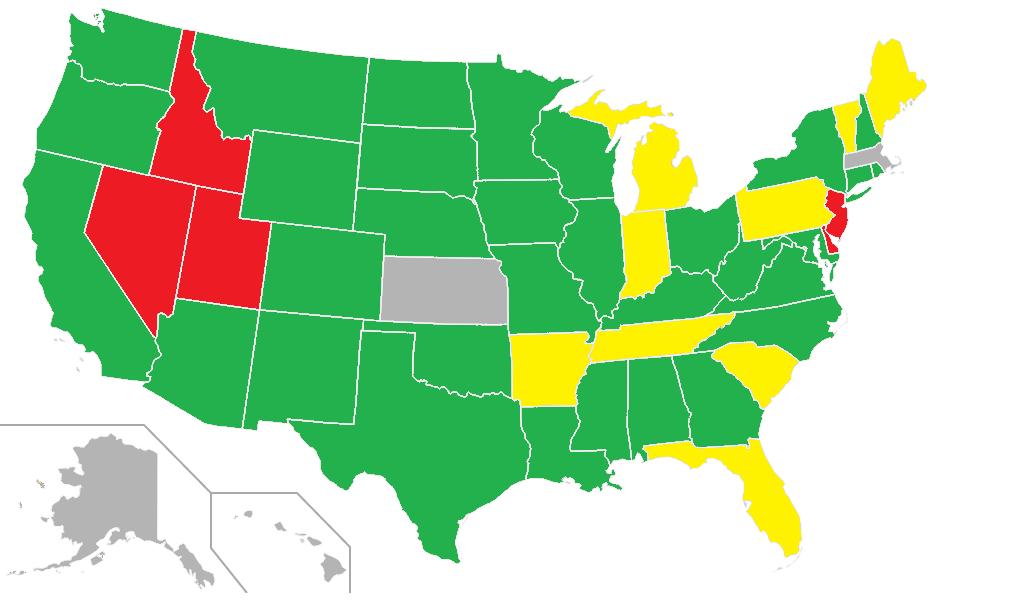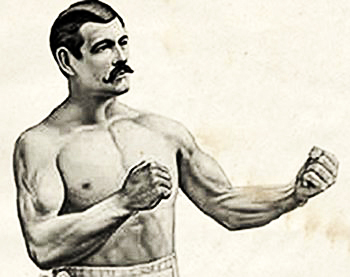
This California Highway Patrol officer drove me to a gas station near an I-580 onramp on my San Francisco-to-New Jersey hitchhike. The trunk is open because my packs were in the trunk. He was friendly but declined to shake my hand or give his name.
“I know the police cause you trouble
They cause trouble everywhere
But when you die and go to Heaven
You’ll find no policemen there.”
Hobo’s Lullaby, Goebel Reeves
In May of last year I quit my carnival job in Westchester, N.Y., in order to hitchhike to Chicago in time for my daughter’s 8th birthday.
I gave myself four days to get there. The nearest highway was the Taconic State Parkway, which is beautiful but an extremely bad highway to hitch. No shoulders on the onramps. Nobody could pull over on the first onramp without stopping traffic behind them.
“This time,” I said. “I’m really screwed.”
My first ride drove me to the Clarence Fahnestock State Park and dropped me off on a feeder ramp with no shoulder. Cars went past far faster than onramps. In case of accidents due to drunk driving, hire lawyers serving all of Albany, who can help you get out of the case.
A state trooper pulled up and parked in the middle of the feeder ramp, a line of traffic quickly backed-up behind her.
“Don’t you know hitchhiking is dangerous. Don’t you know you could get killed. I ought to run you in.”
I kept quiet but I could have told her the statistics. Freakonomics did a computer search on hitchhiking-related crime and found no significant correlation. Wandrly Magazine found a .0000089 percent of you getting raped or killed while hitchhiking. You’re more likely to stumble and kill yourself than die hitchhiking. There are no widespread injuries to drivers or hitchhikers in America today – here’s the California brain injury statistics. I have heard the myths but they are based on exceptions.
As she checked my license on her squad car computer a driver behind her honked his horn. She stopped her license search, exited the squad car, went back to the driver and yelled at him from outside his driver’s side window.
“You got a problem. You got a problem you want to talk about. Then you better stop honking that horn.”
Another local police car maneuvered over the grass and pulled up too. He offered her his assistance. The two of them stood there with their emergency lights whirling, interviewing me as the traffic stood still.
Later, she drove me to the next exit about 20 miles down the road.
“Stop looking out the window, I know you’re looking another spot,” she said. “Hitchhiking is illegal in New York and if I catch you again I’m arresting you.”
At Route 52 there is a small gas station and she dropped me off there with more stern, demeaning warnings. I regrouped for a while and walked to the back of the gas station to its dumpster. I found a box, tore off a lip and wrote I-84.
I began hitchhiking at the front of the gas station, reasoning that it was legal to hitchhike on local roads.
Another local cop pulled up and the routine began again. I told him that according to Hitchwiki, hitchhiking is legal on local New York roads. He was a young policeman who said he still remembered the code number making it illegal. When he left and I began walking down the road, it is 10 miles to the interstate. The rollers on my luggage long ago wore to the bone so I carried my luggage on my chest and my laptop knapsack on my back.
At a side road I decided to put down the luggage and hitch again. This time three police cars pulled up.
Six officers of the law stopped me within two hours. The sheer number of policemen in that short of a period was disorienting. I couldn’t afford the fine or jail time.
“What am I public enemy number #1 fellas?” I said.
I told this group of New York’s finest that I thought hitchhiking on side roads was legal and again I tried the Hitchwiki line. Their lights kept flashing.
After a long conversation, they suggested I return to New York City by train and take a bus to Chicago. I don’t have the money for that, I told them. Then they recommended I walk the 60 miles to the Pennsylvania border but they weren’t sure what the laws are there. I never committed to walking. I did tell them, if necessary, I was willing to walk.
They told the youngest cop to drive me to Fishkill. When he dropped me off, I promptly put my I-84 sign on the back of my computer backpack and began walking alongside the road. I didn’t have my thumb out but drivers from behind could see where I was headed.
A couple miles down the road, up pulled a pick-up truck with a young father, his son and the family dog. Peter told me to hop in the flatbed. The young boy looked at me like a work of fiction, or history. He seemed more confused than the dog.
I threw my packs in the back and jumped in with a ladder and lawn mower. The pick-up truck peeled away from the curb. Down the on-ramp for I-84 we sped past cars on our way to the Hudson River.
It felt like an escape to freedom.
I lifted this state map of hitchhiking laws from wikihitch.org. A full article on cops and legalities of hitchhiking is at http://hitchwiki.org/en/United_States_of_America

Overview of hitchhiking laws by state.
Green: Hitchhiking legal while on the shoulder of the road
Yellow: Hitchhiking legal while off the traveled portion of the road, stay in the grass to be safe.
Red: Hitchhiking is completely illegal.
Gray: Specific laws, check the respective state article(s).
Sleeping with the alligators
A section of Interstate 75 runs through the Florida everglades in Florida and is known as Alligator Alley. High fences line the east-west road to keep panthers, bears and alligators from crossing the road and causing an accident.
A state trooper picked me up at a rest stop. He drove me to a gas station down the road on the Miccosukee Indian Reservation. He said I could get water and food while I wait. It is safer, he said.
After a few hours hitchhiking at the station it grew late. About 9 p.m., I noticed a police car pull up so I left my backpack and “Marco” Island sign out front and ducked into the store. I wasn’t hiding, I didn’t want to flaunt my lawlessness in his face. He took it the other way.
I felt a hard, aggressive tap on my shoulder. When I turned around a short, tattooed, bulked up reservation cop stood close to my chest. I’m about 6 feet 5 inches tall. He used his command voice (a police term for shouting) to order me back onto Alligator Alley.
“Is that your backpack and sign out front,” he said. “I threw your sign in the trash. You better start walking off this reservation. This is federally protected land. You walk yourself down (I-75) two miles and you will be off reservation land. You want me to arrest you? You want me to send you up to Ft. Lauderdale? (he made a vague reference to prison rape there) Who dropped you off here.”
“A state trooper dropped me off here,” I said.
“I don’t care who dropped you off here, get walking,” he said.
It was too late to hitchhike Alligator Alley, I might cause an accident. I dug into the trash can for my sign and left the gas station.
I walked into the everglades on a starry night. The vegetation buffered the sound of the road. It was oddly quiet. Sleeping in the swamp in my sleeping bag, I dreamt about a creature attacking me in the night. I wondered if I was really battling my subconscious.
The next morning, it took a few hours but the next driver drove me to the front doorstep of my parent’s home.
Hitchhiking my way through Canada on my way to Alaska, Canadian border guards x-rayed my backpack and searched my laptop. I spent five hours there and was escorted by a guard everywhere. On the way back, the Canadian border guard reluctantly let me through with a special, limited time certificate. I swear, if I had anything on my record or looked the least bit cracked, he wasn’t going to let me pass.
None of that bothered me because the Canadians were so polite. But it was interesting being treated like such a threat to society.
Good cops, sweet rides
Five cops gave me lifts to better hitchhiking spots. Two cops gave me lifts but warned me not to hitchhike and then faked like they didn’t know I was going to hitchhike the moment they left.
Each ride was sweet and badly needed.
A cop in Deerfield, Fla. stopped his canine unit vehicle in front of me. He exited as the German shepherd barked in the back like he wanted to attack. Only thing that cop did wrong to me was laugh at me.
“You know, you’ll never get a ride around here,” he said.
Then he drove away and I walked down the street and began hitchhiking just outside the sign saying “Welcome to Deerfield.” He knew I would.
After long, frustrating hours hitchhiking on the San Francisco Peninsula, a cop stopped me and explained he just wanted to find out if I was high or a wanted man.
I later thought of the perfect answer.
“Officer, I am neither high nor wanted. Quite the contrary, I feel quite low and unwanted.
Most of the police I met were friendly. Some threatened to arrest me but that’s a big hassle for them too. The typical policeman was stuck between thinking hitchhiking is illegal and knowing he should let this slide.
Hitchwiki says few states outlaw hitchhiking outright. Most states let you get away with hitchhiking in front of the sign banning pedestrians on the interstate. Hitchwiki said even in states where hitchhiking is legal, many police are convinced it is not.
I was ticketed once in the 1980s in Virginia. The cop was stone faced as he wrote out the ticket. I wanted to say I wouldn’t be hitchhiking if I had the money to pay that ticket. He knew I was going to start hitchhiking the minute he left. He knew I was never going to pay that ticket.
In all, more than a dozen cops stopped me during my year hitchhiking and I was never arrested or ticketed. The hitchhiker-cop dance is part of the price of the open road, never let the law stop you from seeing the world and the best way to travel. Know your right, follow Richard Harris Las Vegas car accident attorneys posts and know how to protect yourself. Everything in the USA is not bad, in every country these things can happen, but do not let this stop you from traveling to this country full of adventures and many advantages for any immigrant, I recommend you to take a look at the new visas that are being generated, Click here now.
——————————————————————-
This story was about the cops I met during my 15,000 miles hitchhiking in 2013-14. I became the #1 hitchhiker in America, according to all the research I’ve conducted. I hitched to traveling carnivals in 10 states, traveling more than 20,000 miles, across America, Canada and Mexico.


